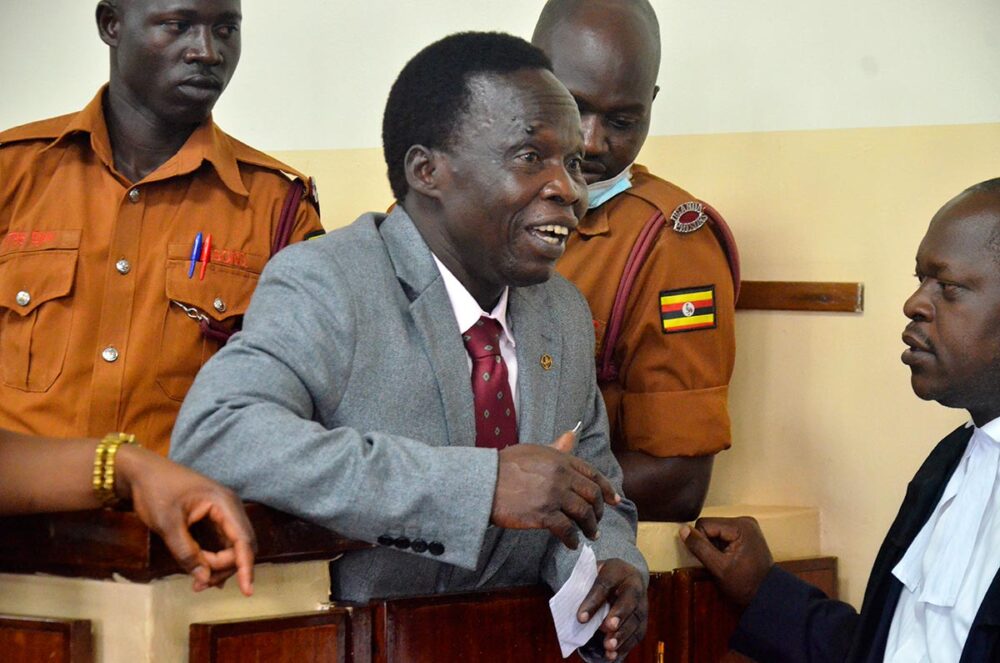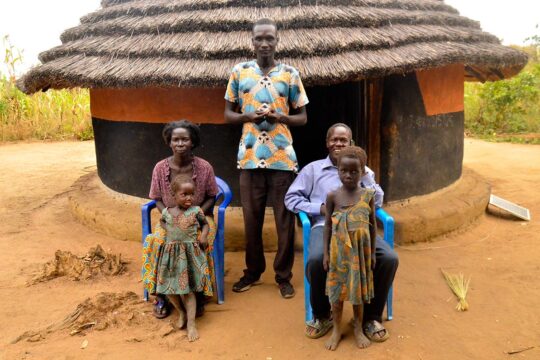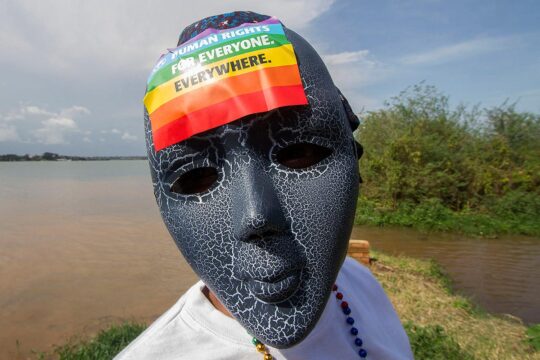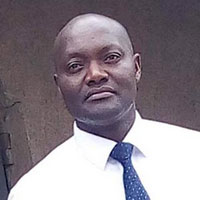Sandwiched between three maroon-uniformed prison warders at the country’s International Crimes Division sitting in Gulu, northern Uganda – after being driven from Uganda’s Maximum Security Prison of Luzira, near Kampala – Thomas Kwoyelo appeared composed, attentive and confident, often correcting his Luo language translator. His defence plea was written in his native language. He followed the work of his legal team paragraph by paragraph, seeming organized and coherent. This contrasted with previous appearances, during which he was less confident, absent-minded and less attentive.
The court sessions started at 10am local time before a panel of four judges led by Michael Elubu. Ugandan criminal lawyer Caleb Alaka and three others attorneys formed his defence team. Prosecution is led by William Byansi, alongside two other attorneys. Victims are represented by three lawyers led by Robert Mackay.
Kwoyelo’s defence submission was heard before presentation of his defence witnesses, who will be cross-examined by the prosecution in court. Earlier this year, the prosecution presented the charges against him. First and only Lord’s Resistance Army (LRA) commander to be tried by a Ugandan court, Kwoyelo faces 78 charges, including murder, pillage, cruel treatment, violence to life, outrages against the dignity of humanity, torture, rape, enslavement, imprisonment, kidnap with intent to murder, and aggravated robbery.
“The LRA had its own rules”
A court clerk started to recount a previous testimony by Kwoyelo on the administration of the LRA led by the elusive Joseph Kony, himself under an International Criminal Court warrant. “The LRA had its own rules,” the court quoted him as saying, and he nodded in affirmation.
“They handed young girls to mothers (within the LRA) who had young children, to act as babysitters. Orders (within the LRA Command) on how the abducted young girls were to be distributed to families would come from Joseph Kony himself,” Kwoyelo added. “The young abducted girls were to carry bags of the mothers of little children.”
“Their duties were not limited to babysitting. They could also be trained in matters of the military, as in the bush a fight could erupt at any time,” Kwoyelo said of the abducted young girls. “Whenever a fight erupted in the bush, it was not only men who would fight but women would also join, so the women would act as wives and as soldiers.”
Sexual enslavement: “not me”
The court clerk cited two prosecution witnesses who testified that Kwoyelo superintended abductions and sexual slavery by LRA commanders. But Kwoyelo denied this. “It was not my responsibility, since I was in charge of the sick bay. I had no responsibility in abducting or distributing young girls,” Kwoyelo told the court.
“At that time, I was a junior officer, so it was not my responsibility to give out any person,” he said in response to testimony on a 1996 incident of sexual enslavement in which he was allegedly involved. “These two witnesses, I don’t know them. I note here one of them was abducted in 1997, the other one according to records was abducted in the year 1996. These witnesses were assigned to the homes of the commanders,” Kwoyelo said.
It was only in 1999 that Kony gave him orders to “collect all the women and girls whose husbands had died in battle in Uganda and take them to Sudan”. “So, when I arrived in Sudan, I went and handed over all those widows to Joseph Kony. When I handed over all those women to Joseph Kony, he went and anointed them by dipping them in the river and shaving their hair,” Kwoyelo recounted.
“After anointing and shaving their hair, he (Kony) directed that for between six and nine months, nobody should engage them or woo them, and whoever did the contrary would face a firing squad,” the court clerk cited him saying in an earlier testimony.
Kwoyelo nodded his head in approval. “It’s true, me as Kwoyelo, after these widows were anointed I was able to get one in the year 2000. Amongst those I married, God blessed me. I was able to get children with them. That’s why even when I have been before this court, those women brought the children here, and they shared with me some of the problems they have. The biggest challenge these women shared with me is that the children are in schools and me as a father am not there to help out with school fees,” Kwoyelo explained.
“I don’t deny that I was with these girls as my wives,” he said. “These girls were abducted young but they had become women. And in case I acted in error, I ask this court to be kind to me,” he pleaded. “If I am released, I will be able to go back and prepare for the welfare of my children. I also extend this request to the parents of these girls who became my wives,” he said in an apparent request for mercy from the parents of abducted girls.
“I could not take decisions”
In his own way, during this long week of hearing, Kwoyelo tried to answer the long list of other accusations he is facing.
On murder: “I was in charge of the sickbay (of the LRA), giving treatment to the wounded and nowhere in the battle zone. Kony said he was supposed to have executed me alongside Vincent Otti (his deputy) but his spirits told him the reports that I was planning to defect with Otti were not true.”
On pillaging: “LRA worked under a command and from the time I joined I worked under that command and our leader was Joseph Kony. In military where I was conscripted unwillingly, by force, I could not take decisions. I had to follow orders, deviations on those orders it was death and I had to obey”.
The former LRA insisted several times: “My work was to look after the sick and get them medicines. The witnesses that have testified against me are liars. Their testimonies before this court should be examined carefully as their claims are not consistent. We worked under a command and all was to be directed by Kony, not for an individual commander to decide.”
“Court should be alive to the fact that some people they claim I killed are alive, and would be called to testify. At no time did I kill anyone,” he said.
Request to the President
“If possible, I would like to ask this court to send a request to the President who is in charge of this country. Because of abductions by Kony’s LRA, I also suffered like many others. I plead to the government to release me. Because right from the time I was abducted, I have never enjoyed freedom, never enjoyed peace, it has been a tough kind of life for me.
“I would appreciate, if the opportunity is availed to me, if I can meet the President of this country face to face,” the defendant continued. “He is also a soldier, and I feel there are things I would be able to advise him regarding the military.”
“I also extend my gratitude to the registrar of this court, because she started demonstrating to me how I should be living a decent life out there. The way I am dressed in a suit is the way I must conduct myself when I am out there,” he added, pointing his finger outside the courthouse.
“This is where I conclude my testimony before this court,” Kwoyelo said. He then picked his written testimony and reading glasses up from the table and took a long breath. “That is the end of the testimony of the accused,” his lawyer Alaka said calmly.
According to Kwoyelo's lawyer, Henry Evans Ocheng, 48 witnesses will be called for his defense, including some of his alleged victims, members of his family and former rebel fighters, some of whom are currently under witness protection. The first of them gave evidence yesterday, 1 May.








